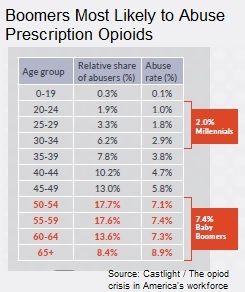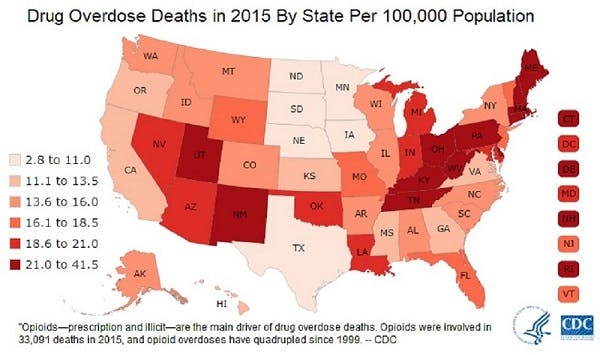Today we’re seeing an upsurge in deaths that are unusual in both cause and in the age of the deceased. The prescription opioid crises, which claimed 15,000 lives in 2015 is affecting families and employers; it became one of the key issues in the debate over the repeal of the Affordable Care Act.
A recent statement issued by a commission examining the nation’s opioids epidemic powerfully encouraged the White House to act when it stated:
Your declaration would empower your cabinet to take bold steps and would force Congress to focus on funding and empowering the Executive Branch even further to deal with this loss of life. It would also awaken every American to this simple fact: If this scourge has not found you or your family yet, without bold action by everyone, it soon will.
With death an awkward subject for most of us, when a coworker is affected by loss of life in their own family, in their extended family or in a friend’s family the “what to say” questions are going to swirl immediately. How do their coworkers how to handle it?
What do you say to a grieving worker?
The best policy in these situations is don’t say much. “I’m sorry for your loss,” or “I’m praying for you and your family and your loved one,” are about the best and furthest words of advice I can give you as someone who has personally experienced this searing emotional devastation from “that” side of things.
Losing my own about-to-be 34 year-old daughter to a fentanyl-xanax overdose one early Sunday morning in January of this year placed me in a state of shock in which things seemed to move surreally. What’s said during this time echoes weeks and months later. Words of advice about how the person’s loved one has “gone to a better place” and how “things will get better” and “God has a plan” only ring flat and mostly meaningless, then and later, no matter how well meaning they were meant to be at the time. The fact is, unless you’ve walked this harrowing path, unless you swim these rocky shoals, you have no idea the pain and horror each and every new dawn brings.
Changed forever
What you can do for this person is continue to be the friend you were before this tragedy struck and understand this person is not the person they were before and will never be that person again. They will be forever changed and for each death they will be changed in a different way.
I can only speak to my own situation, but listening to many people who have lost adult children to this opioid epidemic, one way to describe this is like that of a recent blog poster who described the situation of when someone dies who is ordinarily expected to die (like a grandparent): After a death like that the light that dims inside of us for awhile comes back up in time. When a child dies, because you don’t “expect” your children to die, the light that used to shine inside of us doesn’t come back on to help us find our way back to the “old” us.
The dimensions of the epidemic
Chances are your coworkers may not have ch ildren die (but they might) but they may have brothers and sisters die, and they may have close friends die. As hard to believe at this point in time for some of you reading this, they may have parents die in this epidemic. Baby boomers are four times more likely to abuse opioids than millennials.
ildren die (but they might) but they may have brothers and sisters die, and they may have close friends die. As hard to believe at this point in time for some of you reading this, they may have parents die in this epidemic. Baby boomers are four times more likely to abuse opioids than millennials.
One research study said “employed persons who misuse opioids account for 64.5% of medically related absenteeism and 90.1% of disability costs.” Another found an opioid abuser costs an employer twice as much ($19,450) in health care expenses as a non-abuser ($10,853) in 2015 figures.
Marijuana is the most commonly found drug in workplace drug tests. See “Marijuana Use By Workers Continues to Rise.”
It is populating in our workforces, affecting performance and just now only beginning to be openly talked about. It’s NOT only a blue-collar problem, but this article basically states that passing a drug test is now the biggest challenge hiring in manufacturing faces in this country.
What you can do to help
Talk to your coworker without ignoring the situation of his or her changed circumstances. Understand she or he will have good and bad days and some people will have more of some than the other. There is no formula to this thing and there is no set path of “recovery” – each person must find his or her own new self and it’s hard – it’s so hard and each of us tries in our own way.
If there’s one thing we understand it’s the awkwardness others feel around us. We also understand that many people avoid us because they don’t know what to say, and we know when people do run in to us it’s the first thing on their minds. But it’s OK to talk about our loss.
It’s complicated because there really isn’t much literature written on the subject that teaches us how to behave or react in these situations and it’s hard to know. I guess one reason I’m writing this is the same reason I started writing about phone sourcing so many years ago – to help people understand the process so it wouldn’t be such a taboo subject.
Say their name
It’s okay to say the name of the loved one who is lost.
“I’ve been saying my rosary for Natalie,” is one of the loveliest things someone said to me recently; it’s enshrined in my heart. I cannot tell you how much I want to hear her name spoken. I cannot tell you how much I want to hear her voice again, but because I can’t, if I can hear that she is remembered, my soul is comforted in only the way love comforts the broken-hearted.
Accommodate the grieving
Let your worker know you understand there may be days they can’t come to work. Because they can’t come to work doesn’t mean they don’t want to come to work – help them come back to work. Let them know you don’t understand what they’re going through, but your door is open for them to talk to you, to tell you what they’re going through and that you’ll try to accommodate them as best you can.
It’s the weeks and months after the funeral that get lonely. You feel that people forget and it feels like things get harder – not easier. We that go through this can go down rabbit holes and get lost and stuck. It helps when others call us back up. That’s not to say call us accountable. We do that plenty on our own. Grief and guilt go hand-in-hand through this vale of tears. The loss of hope is the saddest thing.
Just call and say hello
This is a time I’ll recommend even an email is enough if a call doesn’t get through; just let them know you’re thinking about them, you haven’t forgotten their loss. And, as a reminder, it’s still not time to offer advice.
DO sit in silence if silence is what it takes; sometimes there just are no words and it’s okay to say that, too. “I’m sorry,” is many times the second best alternative.
As time goes on I’ll write more about this difficult time. It’s an emerging subject impacting human resources and is only now beginning to be topically discussed. It’s been a taboo subject.
Since this happened to my family, and since my decision to be open about it in my professional social groups, I have had many back-channel communiques from community members who are also affected both personally or one or two-degrees removed. So I know this is a below-the-waves topic. If you research it you will find emerging literature on opioids in the workplace. In another year or so I expect it to be the new HOT conference material. How sad.
“Their name liveth for evermore.” ~ Ecclesiasticus
